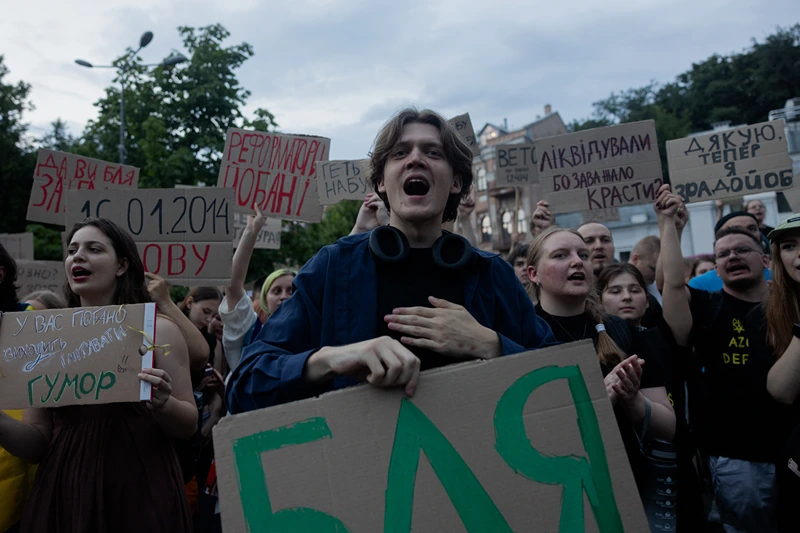


OAN Staff Blake Wolf
11:21 AM – Thursday, July 24, 2025
Ukrainian President Volodymyr Zelensky is facing the first major protest across Ukraine since the beginning of the Russia-Ukraine war — over Zelensky’s suspicious push to dismantle anti-corruption watchdog agencies.
Large crowds of protesters gathered in Kyiv on Thursday, along with the city of Lviv and smaller groups in Dnipro and Odesa, to protest a recently passed bill.
On Tuesday, Zelenskyy enacted a contentious piece of legislation, recently approved by parliament, which places the National Anti-Corruption Bureau (NABU) and its counterpart, the Specialised Anti-Corruption Prosecutor’s Office (SAPO), under the direct authority of the Prosecutor General’s Office (PGO).
The anti-corruption watchdog agencies were established in 2014 following the pro-Western Maidan Revolution of 2014.
Ukraine has long been perceived as one of the most corrupt nations in Europe, with a slew of corruption allegations against many of Zelensky’s close allies — in addition to Zelensky himself.
The move away from the legitimization of the anti-corruption agencies pushes Ukraine further away from its long-term goal of joining the European Union, as the EU has demanded that Ukraine further implement anti-corruption policies if it wishes to become a member nation.
Meanwhile, Transparency International’s Ukraine branch stated that the new legislation introduced a “massive setback in anti-corruption reform,” as well as a “direct threat to Ukraine’s path to the EU.”
After the bill was passed, the Security Service of Ukraine, under the direction of the Prosecutor General’s Office, conducted dozens of raids targeting NABU employees. The raids also honed in on SAPO’s handling of state secrets.
After the backlash, Zelensky claimed that he planned to backtrack on his support for the legislation, stating that it was allegedly only introduced to “protect the agencies from Russian influence.”
“We all hear what society says,” Zelensky wrote on Thursday. “We see what people expect from state institutions to ensure justice and the effectiveness of each institution.”
“We agreed that next week there will be an in-depth working meeting regarding the general action plan,” he continued. “And in two weeks, a joint plan should be ready – outlining the necessary steps to strengthen Ukraine, address existing issues, provide more justice and genuinely protect the interests of Ukrainian society.”
“The anti-corruption infrastructure will work,” Zelensky added. “Only without Russian influences – everything needs to be cleansed of this. And there should be more justice.”
“Of course, NABU and SAPO will work. And it is important that the Prosecutor General is determined to ensure that in Ukraine the inevitability of punishment for those who go against the law is really ensured. And this is what is really needed for Ukraine. The cases that were pending must be investigated.”
Meanwhile, many in Ukraine have concerns over Zelensky’s seizure of the anti-corruption agencies. An unnamed former Ukrainian official told ABC News: “We are not losing the war because the West did not give us enough weapons. We are losing the war because of corruption, lack of professional management and because many do not see why they should fight for Zelensky’s autocracy.”
Anti-corruption Ukrainian activist Vitaliy Shabunin also stated that the bill will allow the prosecutor general to “shut down all investigations involving the president’s friends.”
Additionally, Kyiv Mayor Vitali Klitschko joined protestors at the capital, writing in a Telegram post that the new law “definitely does not bring Ukraine closer to the European Union. It certainly does not bring it closer to democracy, the rule of law, and legality – to those values for which our soldiers are dying today in a bloody struggle against the aggressor.”
The mayor went on to argue that supporters of the bill are “dragging Ukraine faster and faster into authoritarianism,” while “hiding behind the war, destroying anti-corruption bodies, local self-government, silencing activists and journalists.”
“Yes, there are many questions about the independence, impartiality, and adherence to legal procedures by all law enforcement agencies,” Klitschko added. “But the system needs to be changed, not turned into a bulldog of the authorities.”
Why many critics say it’s a power grab:
Both NABU and SAPO had recently launched investigations into figures in Zelensky’s circle—such as Deputy Prime Minister Oleksiy Chernyshov and Timur Mindich—raising suspicions the law helps shield the president’s allies.
Legal analysts and anti‑corruption NGOs warn that subordinating NABU and SAPO to a politically appointed prosecutor general compromises their impartiality and ability to hold officials accountable—including powerful ones.
Stay informed! Receive breaking news alerts directly to your inbox for free. Subscribe here. https://www.oann.com/alerts
